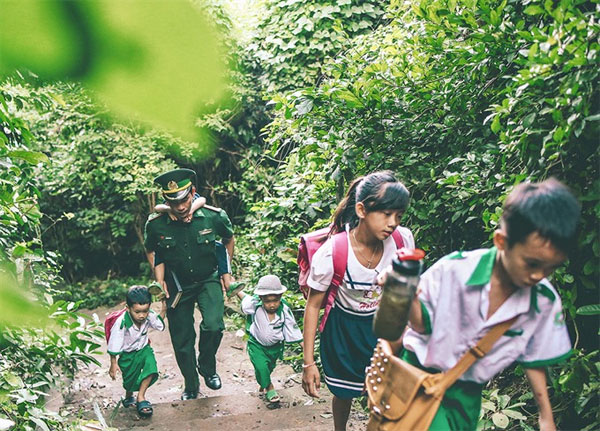VietNamNet Bridge – In a quiet corner of Hon Chuoi Island of the southernmost province of Ca Mau, a teacher and students are beginning a new school year, like their peers across the country.

Senior lieutenant Tran Binh Phuc and his students. — Photo kenh14.vn
But this class is special: the teacher accepted no school fees because the students could not afford to pay them. And without him, the island children would have no teacher at all unless they were able to make the trip to the mainland.
Nearly 20 children, ages six to 14, hold each other’s hands and count while climbing stairs.
Senior lieutenant Tran Binh Phuc, from the Hon Chuoi Border Guards, carries the smallest child on his back, leisurely walking at the end of the line of students.
The child on his back whispers to him, “Teacher, please stay here with us forever.”
Phuc said, “I will stay here for a long time. You should try your best to study and then go to the mainland for further study.”
The children shout “yes” repeatedly and run quickly ahead.
Phuc came to the small island in 2008 to open a school on behalf of the border guards. The guards had intended to open such a school in 1995, but failed because they could not attract enough students. Phuc wanted to be the one to revive the school.
Shortly before he hoped to come to the island, a doctor informed him that he was suffering from blood cancer due to radioactivity contamination. After one year of treatment, he had not recovered completely, but he still asked his commanders to volunteer to work on the island. Five times the Ca Mau Border Guards Headquarter refused his request because of his illness. Finally, after receiving his sixth letter, headquarters agreed to allow him to work as a teacher on the island. He has been here ever since.
Nguyen Thi Le, one of residents of the island, said that her family has been illiterate for three generations. Without schooling, her children would be the fourth.
“When teacher Phuc came to my family and encouraged me to let my children go to school, I refused, as I want my children to work and earn money,” she said.
But Phuc was not discouraged. Every day Phuc goes to Le’s house to convince her. Now her two children finished grade two and can help Le read bills, or calculate money for her trading.
Another case is Thuy Dung and her grandmother.
Dung’s father died when she was very small. Her mother went away and she lives with her grandmother who is old and weak. Everyday Dung follows her grandmother to collect rubbish. During the past three years, the Ca Mau Border Guards have supported Dung with VND500,000 (US$22) per month so that she can go to school. And the support will be continued until Dung finishes university.
Ngo Thi Nhin, who has lived in the island since the 1980s, said, “Phuc is unusually kindhearted. During the past years, he has industriously taken the children to school everyday.”
Phuc also uses his own money to pay for the children’s breakfast.
Phuc said, “Once I was so moved when I witnessed my students play a game of pretending to eat noodles for breakfast because they were too hungry.”
Another time, one of Phuc’s students had an injury on her face. She told Phuc that she was hungry and had struggled with a dog for food, and the dog bit her.
“I decided to ask the owner of a breakfast restaurant to make breakfast for my students and I will pay for it once a year when I receive a Lunar New Year bonus,” said Phuc.
He pays about VND6-7 million ($270-310) per year for his students’ breakfast.
At the end of the school year, Phuc asks the Song Do Town Primary School on the mainland to help him make school reports for his students, who span grades one through five. Phuc’s school on the island is a class to eliminate illiteracy only, so it cannot provide school reports.
“Thanks to such school reports, dozens of students can go to the mainland to study in secondary schools,” Phuc said.
Phuc’s school on the island was rebuilt last year with the fund of VND500 million ($22,200) from the community.
In this new school year, all of his students have enough textbooks thanks to organisations and individuals from the mainland.
Now, from its beginning with five students, the school has 22 students. Four students of the school graduated from university and have jobs.
The school was awarded the title of “Humanity Address” by the UNESCO Centre for Humane Sciences and Community in 2015.
At the beautiful new school building where he teaches, Phuc said, “After seven years of living on the island, I find it familiar as my hometown. Local residents love me and present me such simple presents including fish and fruit. My students are lovely and obedient. It is my encouragement.”
“I come here because I see the children’s image of me and I understand that without knowledge, their lives will be closed on the island. I hope that as long as I live, I will bring the children not only knowledge but also a sense of morality so that they can better their future,” said Phuc.
Pham Van Anh
VNS